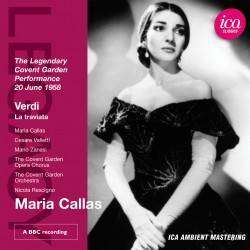|
Back
02/23/2012
Giuseppe Verdi: La traviata
Maria Callas (Violetta Valéry), Cesare Valletti (Alfredo Germont), Mario Zanasi (Giorgio Germont), The Orchestra and Chorus of the Royal Opera House, Covent Garden, Nicola Rescigno (Conductor)
Recorded Live at Royal Opera House, Covent Garden (20 June, 1958) – 121’
ica Classics 5006 – Booklet with essays in English, French and German

   
Maria Callas’ recordings of Verdi’s quintessential heroine, Violetta in La traviata, are as legendary as they are problematic. The live Lisbon recording of 1958 boasts the cleanest sound, although the EMI re-mastering takes some of the life and bite out of it. Furthermore, Callas’ collaborative partners, Alfredo Kraus and Mario Sereni, as fine as they are, aren’t as thrilling as their counterparts in the 1955 La Scala recording. The latter boasts not only a younger Callas, but also an ardent Giuseppe Di Stefano and imposing Ettore Bastianini, not to mention Carlo Maria Giulini in the pit. Sadly, the recording quality is quite distant and distorted, despite EMI’s best efforts. This recent re-mastering from ica Classics captures Callas singing Violetta at Covent Garden in 1958 (a few months after the Lisbon performances). Given the deficiencies of the former recordings, is this one the Holy Grail of Callas Traviata recordings? Yes and no.
It is fair to say that by the summer of 1958, there was some noticeable wear on Callas’ voice. As in the Lisbon performance, the shrill edge is evident and the burdensome high notes betray some strain and wobble. Still, for the most part, Callas’ voice was even through the registers with agility, control and power. Callas made the oft-repeated axiom of requiring three different sopranos for each act of Traviata moot, and that is a credit to her miraculous artistry. She navigates the florid passages of Act I with ease and charm. The great soprano occasionally loses the graceful decay of treacherous phrases here in this performance, but “Un dì felice” is tender and alluring. Callas sings “Sempre libera” with her trademark reckless abandon and determination. While her high E-flat at the conclusion is not her finest moment in the recording, it is thrilling.
Her Act II lyrical phrases are stunningly delivered with incredible breadth. Callas’ Violetta is absolutely palpable. If her Act II scenes with Germont and Alfredo don’t quite match the dramatic intensity of the La Scala recording, it is forgivable. After all, Callas on her second-best day is better than anyone else’s best. She sings “Ah! Dite alla giovine” with seemingly impossible control and intimacy. By “Ah m’ami Alfredo” Callas’ transformation into the most selfless heroine in opera is laid bare before the listener in heart-wrenching clarity. In Act III, Callas’ stamina, despite her dramatic intimations, shows no sign of dissipating, although she may hold back too much in “Addio, del passato,” as the exposed phrases lose some of their authority. Nevertheless, she is masterful to the end with the concluding words of the opera being Violetta’s.
In Cesare Valletti, Callas has a worthy Alfredo. The fine tenor sings here with passion and ability. His bright tone may not be to every listener’s taste (I find it borders occasionally on an “Irish Tenor” sound), yet it is resonant and perfectly believable as the young lover. His “De’ miei bollenti spiriti” is lyrically expansive and controlled. His attacks on high notes are often spread, but he outdoes himself with a potent “Ogni suo aver tal femmina.” Like his baritone co-star, Mario Zanasi, Valletti unfortunately does not get to sing his cabaletta. Zanasi’s Germont is unimposing, yet beautifully sung with a featherweight baritone. His is probably not most people’s ideal Germont sound, but his technical assuredness is welcome (his high A at the end of Act II, scene I is impressive). Nicola Rescigno leads a brisk performance that is more impactful than refined, but it is coherent with obvious consideration for the singers’ needs.
The most enticing aspect of this recording is the sound quality. The mono sound has impressive warmth and vividness. There are moments in Act II when Callas’ voice seems just yards away. The balances aren’t always ideal, which is not surprising, but there is very little distortion, even when the forces are blaring away. Of the Callas Traviata recordings, this one, while not perfect, offers the finest balance between realistic and clean sound. That this isn’t the best of the three performances should not be a deterrent. This is Callas singing one of her most beloved roles in wonderfully clear sound. For that reason alone, admirers of Callas will surely want to acquire it right away.
Matthew Richard Martinez
|